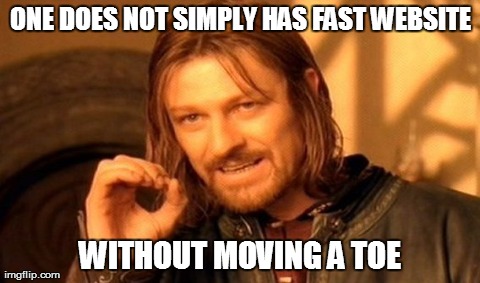In this blog we’ve already discussed the importance of response time. And I hardly need to tell you that when a website loads slowly, you’d rather take your business, reservation, purchase or pleasure somewhere else. So, now that you have your website up and running, you definitely don’t want it to be an underachiever and drive those potential clients away simply because it fails to load properly. So here are 5 simple ways to improve your website response time without too much effort.
Minimize the HTTP Requests
The greater part (and I mean like 80%) of the response time is spent downloading the front-end components of the page – images, scripts, CSS and so on. Therefore, fewer components to download mean fewer HTTP, thus faster response time of your page.
Use combined files, CSS sprites and Image Maps. You may find them a little challenging at the beginning, but if you really want your site to perform well this is the place to start.
Compress to Impress
Here is another marvellous way to improve the performance of your site. Compression helps decrease the response time of a site by reducing the size of the HTTP response. The most popular method to do this is Gzip. It helps you reduce the response size by almost 70%. Generally, servers choose which file types to Gzip, and while most sites compress their HTML content, you can take it one step further and compress even your scripts and stylesheets. This will reduce the weight of your site, and significantly improve user experience.
Minify the JavaScript and CSS Documents
To minify means to remove all the unnecessary characters from the source code without losing any of its functionality. This method works especially well for JavaScript documents as it reduces the size of the downloaded file, thus has a direct effect on improving your website response time.
You can always do it manually but why bother when now you have such good tools like JSMin and YUI Compressor, which can even compress your CSS files.
[Update] Another free tool suggested by our reader Natalia is the WebSitePlanet JS & CSS Minifier - it is ad free and works both for CSS and JS.
Stay Away from Redirects
Unless it is absolutely necessary, avoid redirects as they notably slow the response time. This happens because during the redirection nothing in the page can be loaded until the HTML from the new location arrives. Just don’t insert any redirects unless you really have to.
Monitor Your Server Performance
Even if you have the best performing and most beautifully and efficiently designed site ever, if your server is not working it is all useless. Escape from this danger by signing up here.
To read more useful tips on site optimization visit the Yahoo!Developer Network and Six Revisions sites. Feel free to share your own tips and tricks to improve website response time in the comments below.



 Copyright 2000-2026, WebSitePulse. All rights reserved.
Copyright 2000-2026, WebSitePulse. All rights reserved.